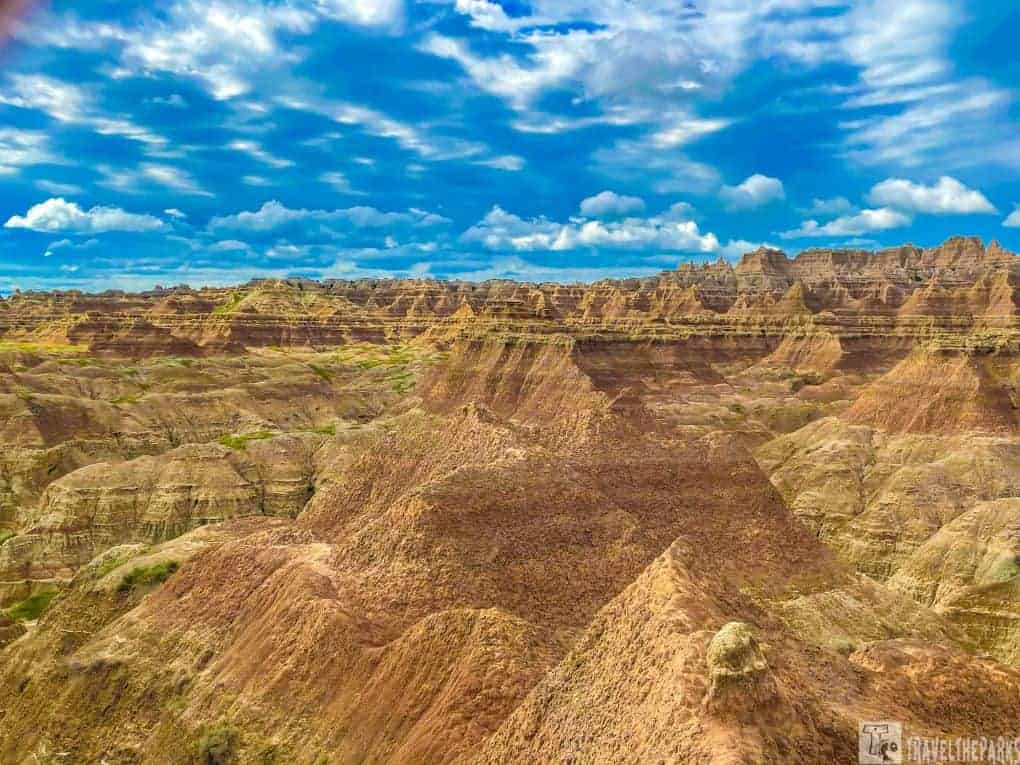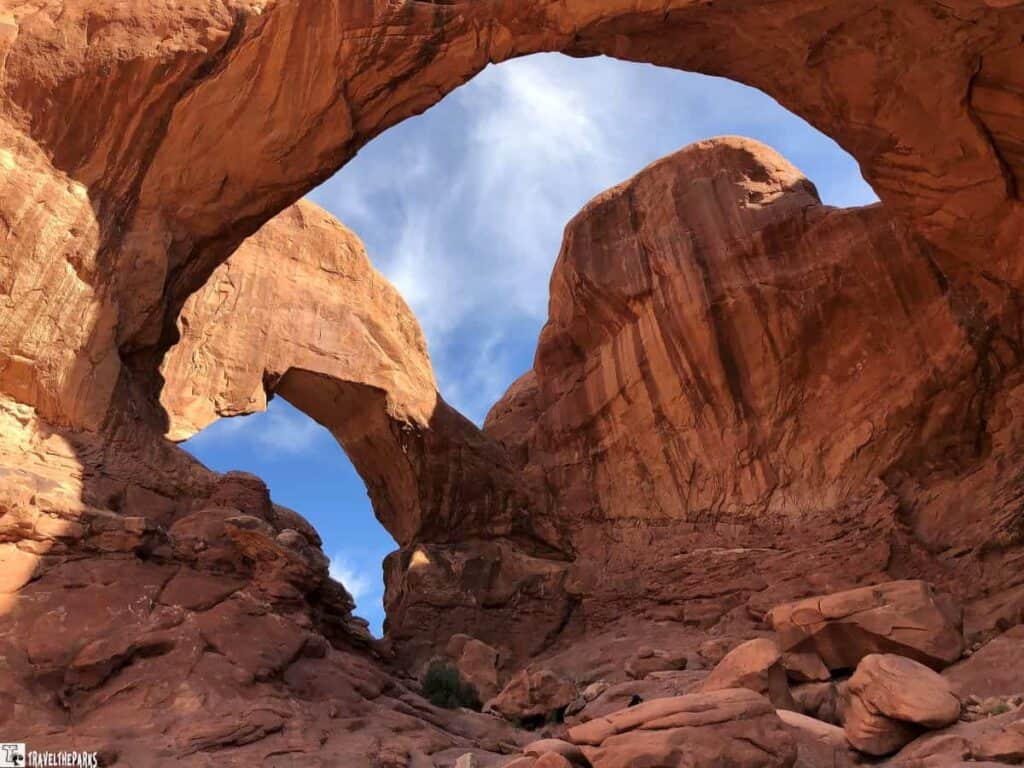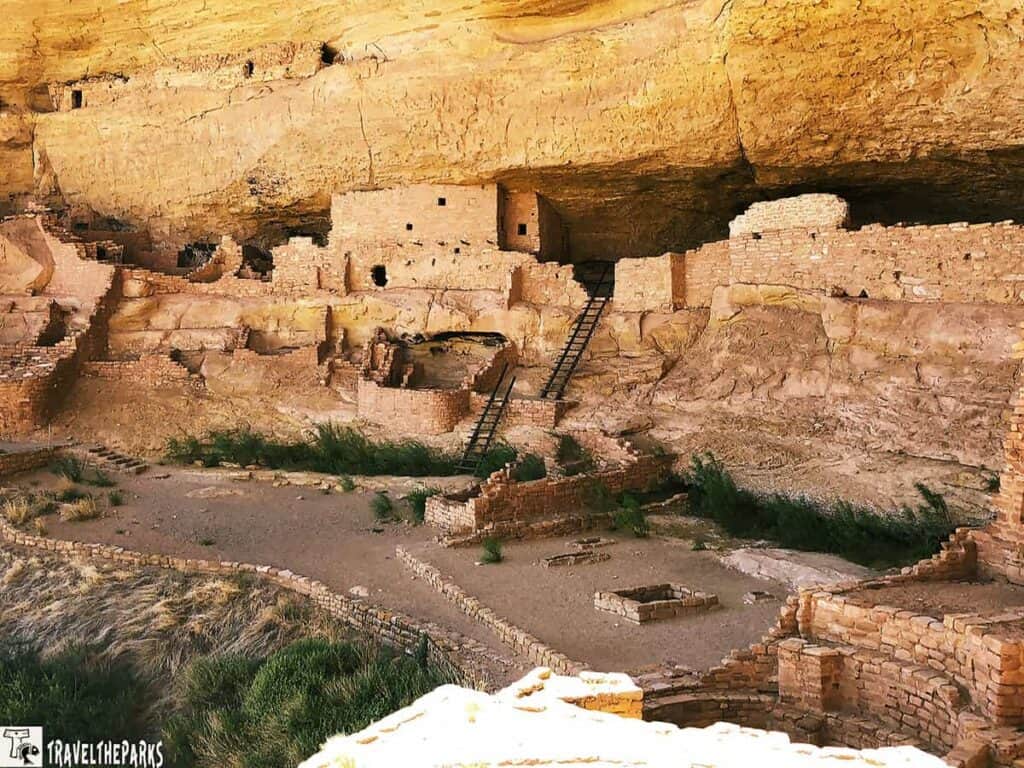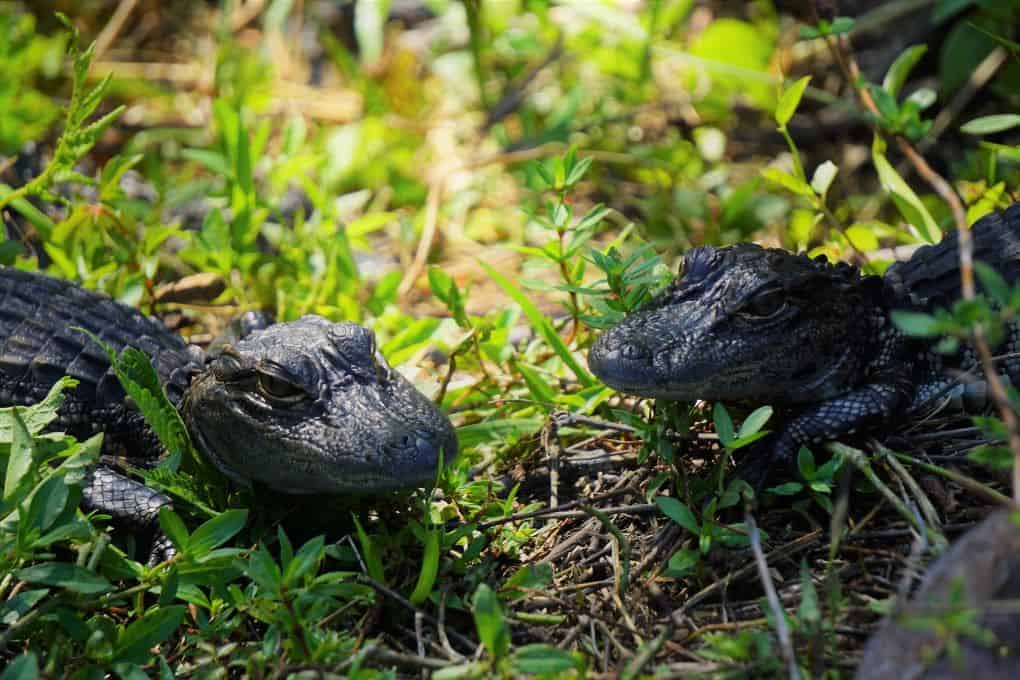Have a tight one day schedule for your Badlands visit? On our recent trip to South Dakota’s Black Hills, we knew that adding the Badlands to our itinerary was a must do. This ultimate tour guide of the Badlands National Park will help you explore the major highlights of the park. Discover the natural beauty in these red sand cliffs. This otherworldly landscape holds many secrets, including ancient marine fossils.

So why is it called the badlands? Mako Sica is what the Lakota called the Badlands. It translates literally to bad lands. The park encompasses 244,000 acres. It was designated a national park on January 29, 1939.
This post may contain affiliate links, meaning if you purchase something through one of these links, we may earn a small commission at no extra cost to you! Read the full disclosure policy here.

Table of Contents
Planning Your Trip: How to Get to Badlands National Park for a Perfect Day Visit
It’s in the southwest part of the state, not too far from the Black Hills. The park is huge, covering an extensive area of the Great Plains. Badlands National Park is a should be part of any Midwest road trip.
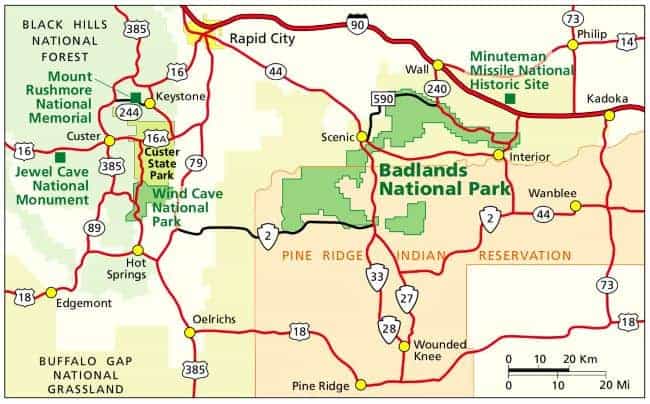
From Rapid City
- The Badlands are easily accessible if you fly into the regional airport at Rapid City. We arrived via Denver for our Great 8 Road trip of the South Dakota Black Hills. We rented a car driving an hour east, taking 90 to exit 131 in Cactus Flat, SD, then continue south on SD-240 for 3-miles.to the Northeastern Entrance.
- You can also enter the park near the town of Wall, starting at the Pinnacles Entrance. Take I-90 east to exit 110 in Wall, SD, then continued south on SD-240 for 8-miles.
- Sioux Falls to Badlands National Park–275 miles (approximately 4 hours)
- Rapid City to Badlands National Park–62 miles (approximately 1 hour)
- Denver to Badlands National Park–375 miles (approximately 6 hours)

Know Before You Go: Badlands National Park
- Park Hours: Open 24 hours, 7 days a week., but visitor services and hours may vary seasonally—check the official website before you go.
- Entrance Fees: There’s an entrance fee per vehicle; consider an America the Beautiful National Park Annual Pass if visiting multiple national parks. At just $80 per year, the pass grants you free access to over 2,000 federal recreation areas in the United States, including all 62+ national parks.
- Cell Service: Limited or no cell reception in many areas—download maps offline or bring a GPS device.
- Best Time to Visit: Spring (April–June) and fall (September–October) offer the most comfortable temperatures, fewer crowds, and beautiful lighting for photography. Summer can be hot and crowded, while winters are quiet but cold.
- Wildlife Safety: Keep a safe distance from wildlife like bison, bighorn sheep, and prairie dogs; never feed the animals.
- Facilities: Restrooms, picnic areas, and the visitor center are located near main points, but amenities are limited deep in the park.
- Timing: Sunrise and sunset offer spectacular views and cooler temperatures—plan to visit overlooks during these times.
- Leave No Trace: Help preserve the park by packing out all trash and sticking to designated trails.
- Pet Policy: Pets are allowed in developed areas (roads, campgrounds, picnic areas) but not on trails or in backcountry areas. Pets must be leashed at all times and never left unattended in vehicles during hot weather.
- What to Bring on Your Adventure: Bringbinoculars to get an up-close view of the animals in the park. Wear good hiking boots with traction and good ankle support. When hiking in the sun and heat of summer, you’ll become dehydrated quickly. The usual recommendation for water on a two-hour hike is two quarts per hour (per person).
- Begin your national park app adventure by downloading the NPS App onto your mobile devices. Downloaded it for free through the App Store and Google Play.

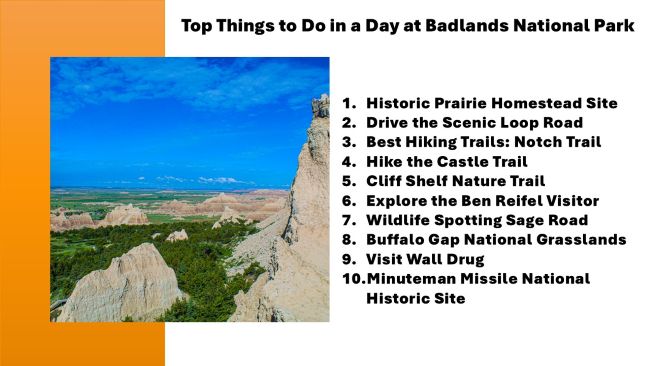
Top Things to Do on a Day at Badlands National Park
We are excited to share our favorite highlights with you from Badlands National Park, which is packed with unforgettable sights, scenic drives, and unique experiences. We started our one-day adventure at the Northeast Entrance off Highway 240, following the Badlands Loop Road through a series of must-see stops. Whether you follow our route or begin at the Pinnacles Entrance on the west end, this itinerary will help you make the most of your day in the park.
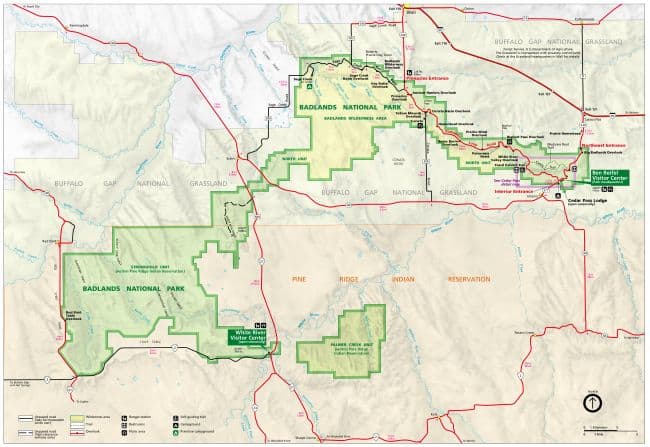
First Must-Do: Visit the Historic Prairie Homestead Site
A mile northeast of the park entrance on Highway 240, you can gain a glimpse back in time at how the early pioneers lived. The Prairie Homestead Historic site is listed on the National Registry of Historic Places. For us, was like stepping onto the set of Little House on the Prairie. There is an entrance fee. Starting at the visitor center, the self-guided tour begins with a historical 8-minute video documentary. It makes you appreciate the tenacity, resourcefulness, and ingenuity of these early settlers.

The authentic homestead of Mr. & Mrs. Ed Brown has a sod house circa 1909. Sod houses were an alternative when logs were not readily available. Their insulating qualities helped to keep them warm in winter and cool during the summer. Outbuildings include the root cellar, animal barn, chicken coop, and outhouse. Even though you won’t spend a lot of time here, this exhibit is very educational and worth the stop.
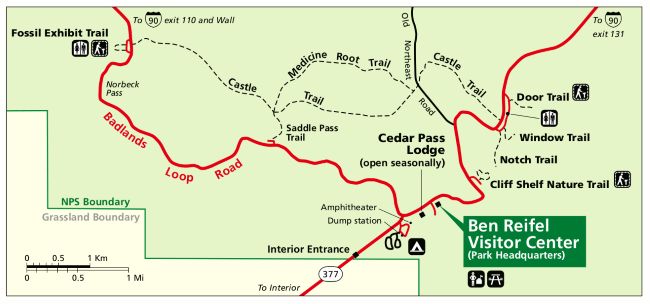
Must-Do #2: Drive the Badlands Loop Road for Hikes, Photos, and Epic Vistas
This is a 38-mile scenic loop (Hwy 240) through the most picturesque landscape. For optimal views, sunrise and sunset really offset the colorful layers in the rock. Loop Road is a two-lane paved road. It sees a lot of traffic in the summer. The park remains open 24 hours a day (weather permitting), all year long.
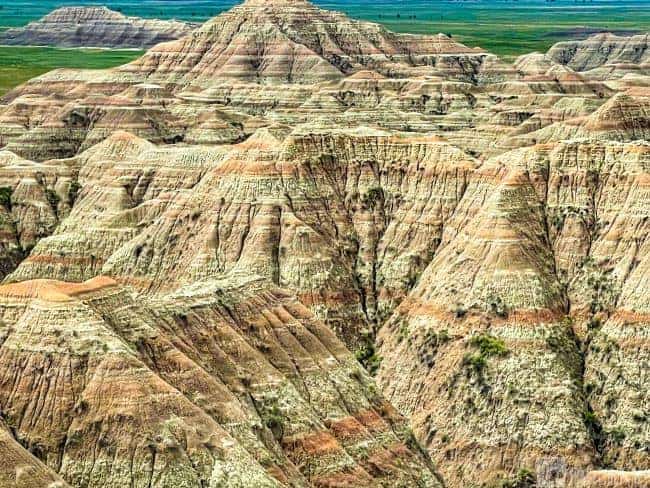
The scenic loop road traverses the heart of the park. You will discover a wealth of information along the way, so take your time and check out the various viewpoints. Each will give you a completely different perspective on the park.. There are 15 overlooks along the loop.
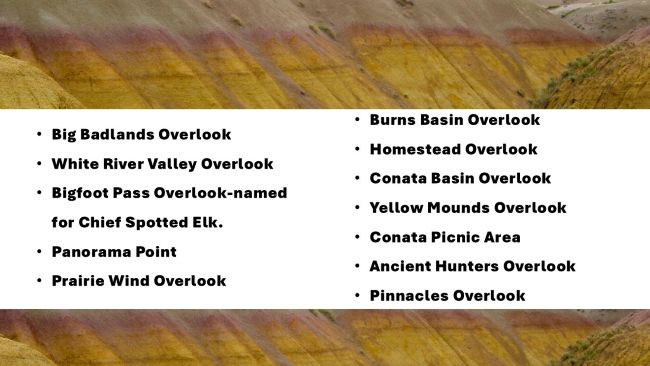
Badlands Loop Road Highlights: Top Stops for Photos and Views
Overlook #1: Big Badlands Overlook
This is the first overlook stop when entering from the North East Entrance Station is the Big Badlands Overlook. It is only a short 0.2 miles boardwalk. Gives you a stunning introductory view of the colorful badlands, has a WOW factor.

Overlook #2: Fossil Exhibit Trail
A 0.4-mile raised boardwalk loop has educational displays. The informational boards have fossil replicas of the ancient life forms that once roamed the area. This trail is wheelchair accessible. Definitely kid-friendly, allowing them to go off trail and climb in the formations to find their own adventure.There is a large parking area for this trail. Additionally, there is a shaded gazebo and a restroom facility at this trailhead.
Note: Remember, do not disturb or take any fossil or artifact from its place or the park. All collecting of rocks, minerals, plants, fossils or cultural objects (i.e. arrowheads) is illegal and punishable by a fine.

Overlook #3: White River Valley Overlook
The overlook has spectacular views that showcase the red horizontal strips in the eroded rocks. Against the backdrop of the green valley below, the colors seemed even more vivid.

Overlook #4: Panorama Point
An endless expanse of badlands buttes stretches out to the horizon. The eroded clay formation gives a dramatic, colorful view of the Badlands. What are the colored layers we see in the Badland formations? The winds of time are constantly eroding the colored layers of the Badlands. Wind and rain etch the sedimentary layers, carving these dramatic cliffs. The fossil-rich Badlands, many dating 34-37 million years to the Cretaceous age, are buried within this ancient seabed. Two layers of the Chadron and Brule formations are the location for many of these finds.

Overlook #5: Burns Basin Overlook
Wilson Burns raised flocks of sheep in the basin during the early 20th century, and this overlook bears his name. He had the luxury of finding a natural spring. The viewpoint has a small, railed platform. This overlook provides a bird’s-eye view of corrugated cliffs, steep canyons, and dome-shaped hills. Just a short distance on the opposite side of the road from Burns Basin is the Homestead Overlook. Look for wildlife. We saw Bighorn sheep grazing in the grasses.

Overlook #6: Yellow Mounds Overlook
This place was mesmerizing to us. I have to say that it was my favorite. The photos do not do them justice. The colors are incredible. An ancient sea once covered the area and, as it drained 67 million years ago, decaying plant material layered to create these mounds. The ancient fossilized soils are known as paleosols. The reason for the yellow coloring is the mineral geothite.


Overlook #7: Pinnacles Overlook
If you want to watch the sunset, this is the overlook to choose. It has 180-degree jaw-dropping views. It is just a short walk down a set of wooden stairs to the overlook. The view from the plateau showcases the etched geological features-pinnacles, ridges and unearthly jagged ravines below.


Activity #3: Explore the Best Hiking Trails in Badlands National Park
Hiking is one of the best ways to truly experience Badlands National Park. While planning our Badlands National Park day trip guide, hiking was a must. Parking at the Notch Trailhead provides easy access to several great trails—Door, Window, Castle, and Notch. After catching a stunning sunrise at Big Badlands Overlook, we spent the rest of the early morning exploring the Door and Window Trails, then ventured onto the Notch and Castle Trails.
PRO Tip: The park has an open hiking policy. This means you can hike off-trail. You can explore freely in the Badlands as a visitor.

Door Trail is 3/4 mile walk round-trip on a boardwalk. Wonderful views of the layered bluffs. Once you step off the boardwalk, follow the yellow poles marked with numbers. It was really ethereal, like walking on a moonscape.

Window Trail is short, easy 0.25 mile on a boardwalk with an overlook of some more beautiful scenery. At the end of the boardwalk step off to explore the unusual rock formations. Follow the numbered markers to the end for closer views of the rock face.

The Must-Do Hiking Experience: The Thrilling Notch Trail
Before coming to the Badlands, I read you should hike the Notch Trail. If you do only one hike in the park, make sure it is this one. This 1.5-mile out-and-back trail is definitely a bit challenging. The ladder happens near the halfway point on the trail. Getting there early is key to not having to wait forever to climb the ladder. The later you arrive, the more time it takes since you have those coming down as well. A unique experience: the ladder was more difficult going down than up. A little slippery, so you’ll definitely want your good hiking shoes, and bring water.
NOTE: A word of caution in the summer rattlesnakes frequent the trail rocks, so choose wisely when reaching for a handhold.

At the top of the trail, I had to cope with my fear of heights for a few moments, but the views were totally worth it! Before reaching the end of the trail, an unmarked trail veers off to the left. Follow it to see even more panoramic views of the White River Valley. Today, we had the trail to ourselves for almost the whole time. I must say, this made it more enjoyable.

Activity #4: Hike the Castle Trail for a True Backcountry Experience
This is not for the faint of heart. The 5-mile point-to-point, relatively flat trail. In all, this is the longest trail in the park, which begins at the Door and Window parking area and runs five miles one way to the Fossil Exhibit Trail. There is a backcountry sign-in sheet.

In all fairness, we have no time to walk through the whole trail. Instead, starting directly across the road from where the Notch Trail combined it with the Saddle Pass Trail for 4.3 miles. One of the best features of tackling the trail starting from the Notch area is that you will end at Saddle Pass, going down the slope. There is little to no shade available, so bring plenty of water, sunscreen and a hat.
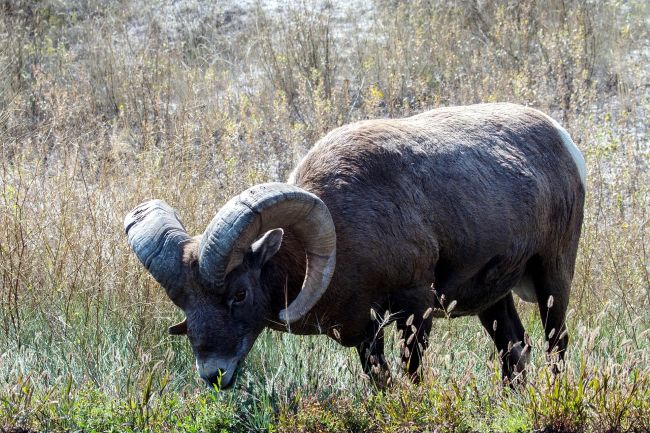
It was an incredible hike, spotting two bighorn sheep and a few mule deer. Along the way, we walked through prairie meadows and canyon areas that had gorgeous views of the geological formations. We even found toadstool formations, which reminded me of our time in Bryce Canyon National Park. This trail gives you a perspective of what the pioneers encountered here. It is easy to see why early explorers called it an inhospitable no-man’s-land.

Activity #5-Cliff Shelf Nature Trail Offers Magnificent Views Without the Climb
Just north of the Ben Reifel Visitor Center, this trail is a 0.5-mile easy interpretive loop. The elevated boardwalk passes through a cedar scrub forest. Walkway platforms at the high-point overlook panoramic views of the White River Valley. It is a perfect quick hike for kids. Great for birding. We saw mountain bluebirds and meadowlarks in the cedar copse.

Activity #6-Make Time for the Ben Reifel Visitor Center on Your Badlands Day Trip
Near Norbeck Pass, the Badlands Loop Road descends to the visitor center. Whenever we need information about the park, the visitor center is our go-to source. Open every day, 9:00 AM – 4:00 PM. The museum’s educational exhibits include human history, wildlife, fossils, and geology. We took the time to watch the park introduction video. In the 20-minute park film, The Land of Stone and Light, you will learn about the plants and animals that have frequented the park. Remember to get your passport stamps. The passport stamp kiosk is located beside the front door. Kids can take part in the Junior Ranger program inquire at the ranger desk.

Fossil Preparation Lab: Discover What’s Really Found in the Badlands Rocks
Amateur paleontologists can venture through the Fossil Preparation Lab to see real archeologists working on the ancient treasures. The paleontologist volunteers work every day to uncover the secrets of the past. It had exhibits and a staff member to answer questions about fossil preparation and paleontology. The Fossil Room features staff preparing fossils.
For kids, there’s something magical about dinosaurs. There are lots of prehistoric fossils at Badlands National Park, but there are no dinosaurs, such as Tyrannosaurus Rex or Velociraptor. Rather, you will find miniature horses, brontotheres-rhinoceroses, and Oreodonts-sheep-like herbivories from the Age of Mammals. Oreodonts are the most extinct mammal fossil found in the park.
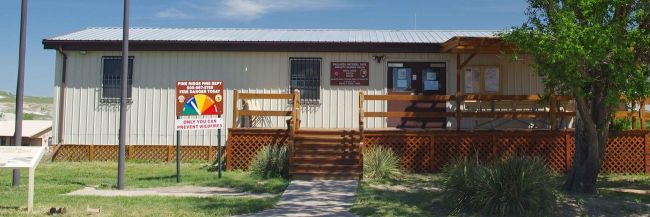
Badlands National Park Day Trip Guide Southern Stop: Visit the White River Visitor Center
If are able to add additional days or time to your itinerary for the Badlands National Park, consider a trip south. It takes you to the southern region of the park—especially near the Stronghold Unit or Pine Ridge Reservation—the White River Visitor Center is well worth a stop. This quiet and less-visited part of the park offers a deeper cultural perspective, with exhibits focused on Lakota heritage and the natural history of the area. Open seasonally, the center provides ranger information, maps, and a peaceful atmosphere far from the crowds. It’s a meaningful addition to any complete exploration of the park, especially if you’re seeking a more local and educational experience.

The rocks here in the park are too young to hold the larger land giants, since most of the landscape here was covered by the Western Interior Seaway. Visitors are more likely to find impressions of vegetation, mosasaurs, ammonites, or smaller invertebrates. We learned that ancient dinosaurs once inhabited this marine sea, and fossil junkies can explore the Badland formations searching for that perfect find. Just remember to leave no trace, photograph and mark the artifact, but leave it as you found it.

Activity #7-Wildlife Spotting on Sage Creek Rim Road: Bison, Prairie Dogs & More
If you’re wondering how to spend a day in Badlands National Park, a drive along the Sage Creek Rim Road (SD 590) is a must for wildlife lovers. This winding gravel road cuts through the Sage Creek Wilderness and offers some of the best chances to spot the park’s iconic animals. Along the way, keep your eyes peeled for bison, bighorn sheep, pronghorn deer, prairie dogs. If you’re lucky—burrowing owls or even a rare black-footed ferret.
We didn’t drive the full 30 miles. Instead, we turned onto County Road 502 just past the Sage Creek Basin Overlook. This scenic detour loops back to Highway 240, offering a peaceful and rewarding back road experience that showcases the park’s untamed beauty—an essential part of any Badlands National Park day trip guide.

Sage Creek Rim Road: Stop at Roberts Prairie Dog Town
Who doesn’t love adorable prairie dogs? They are so entertaining, with their scurrying from burrow to burrow. They’re high-pitched squeaking and barking a warning to one another. Prairie dogs are diurnal and live in towns, which are sometimes populated by thousands of individuals and extend over many miles. Roberts Prairie Dog Town is 5-miles west of the Pinnacles Overlook. Even though we had watched prairie dogs at Devils Tower National Monument, and Wind Cave National Park, it was hard to resist not staying here longer.

Sage Creek Rim Road: Hay Butte Overlook
The view of the eroded cliffs seems endless at this viewpoint. The first turnout on the Sage Creek Rim road, you can look back to the Pinnacles overlook.

Sage Creek Basin Overlook
This is the last overlook on our scenic drive. From this point, there are opportunities to do backcountry hiking. If you truly want to experience all the diverse landscapes the Badlands offers, we highly recommend getting off the trail. The Sage Creek Wilderness Area is a vast expanse of prairie bisected by Sage Creek. The ethereal landscape gives you a feeling of being the first explorers here.

Activity #8: Buffalo Gap National Grasslands–A Hidden Gem Near the Badlands
Just outside the park boundary lies an unexpected oasis — Buffalo Gap National Grassland. One of 20 grasslands managed by the USDA, this vast area spans over 600,000 acres of rolling prairie and vividly colored geological formations. It’s the second-largest protected national grassland; a great addition to add to your list of things to do at Badlands National Park.
Near the Badlands boundary, within the grassland itself, dispersed boondock camping is permitted for those seeking adventure. Camp right along the edge of the Badlands and wake up to spectacular sunrises, sweeping views, and regular sightings of pronghorn, mule deer, bighorn sheep, and bison. There are no services, but the peace and panoramic beauty make it well worth the stop.
Prefer a more developed campground? Inside the park, consider Cedar Pass or Sage Creek Campground, or the cozy Cedar Pass Lodge.

The visitor center is one block north of Wall Drug. We stopped for passport stamps and map information. Buffalo Gap National Grassland is open year-round, 24 hours per day. The visitor center is open 8am to 8pm daily from Memorial Day to Labor Day and 8am to 4:30pm weekdays the rest of the year.
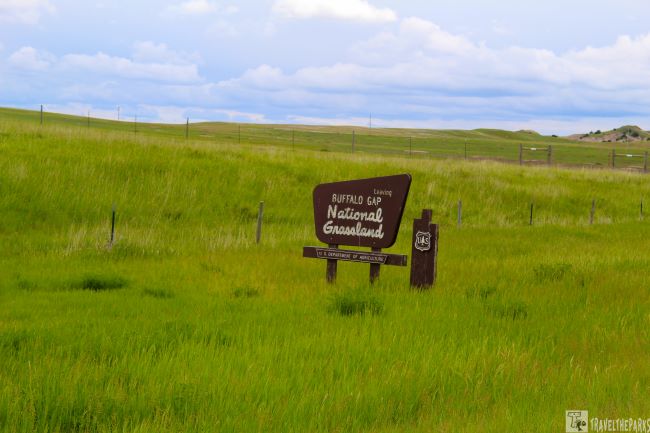
Activity #9: Visit the World Famous Wall Drug – A Must-See Roadside Attraction
From the east, the Badlands Loop Road takes you right into Wall, SD. Even if you only have a one-day tour of Badlands National Park, you must visit Wall Drug. Yep, it is the iconic touristy place most seek to avoid, including us. However, it is definitely a place one must see at least once in their lifetime. You could spend all day in this sprawling American roadside attraction. As the multiple highway billboards advertise, free water or 5-cent coffee are a staple. The store has a vast selection of souvenirs, and every trinket imaginable. Most of the items come from China. However, I found a unique locally carved bison made from ironwood.

The quirky outdoor displays in the Wall Backyard are a magnet for the kids. Where else can you possibly pose on a giant jackalope? I remember my dad telling me about the legendary animal fabled to be a cross between a jackrabbit and an antelope. From the Wyatt Earp statue to the covered wagon, all are picture worthy. Both the backyard splash pad and the shooting gallery arcade are fun outdoor activities for the whole family.

Because we were starving, we ate at the Western Art Gallery, a cafeteria-style restaurant. The burger lunch is a little overpriced, but the food came quickly and tasted pretty good. Probably because we were hunger. We followed the map of the Wall Drug Mall, checking out the Traveler’s Chapel, the quintessential mining experience, and the bookstore before grabbing a signature homemade donut and leaving.

Activity #10: Discover the Hidden Story at Minuteman Missile Historic Site
If you’re building a Day Itinerary for Badlands National Park, be sure to include a stop at the fascinating Minuteman Missile National Historic Site. Located just outside the park entrance at Exit 131 on Hwy 240, the site is easy to find—simply turn left, and you’ll see the visitor center directly across from the turnoff. The historic site actually spans three separate locations: the Minuteman Missile Visitor Center, Launch Control Facility Delta-01, and Launch Facility Delta-09 (Missile Silo). Even if you’re short on time, the visitor center alone is worth a 30-minute stop. The Cold War exhibits are both informative and powerful. We spent a good amount of time exploring all three sites, and it added a memorable historical layer to our Badlands National Park day trip guide.

Final Thoughts: One Day Ultimate Itinerary For Badlands National Park
After exploring Theodore Roosevelt National Park in North Dakota, I was eager to see how it compared to the Badlands of South Dakota—and the difference was striking. While both landscapes are labeled “badlands,” the terrain here feels more otherworldly. The jagged formations and bold colors draw in hundreds of visitors, yet many never venture beyond the roadside overlooks. When I was crafting this day itinerary for Badlands National Park, I wanted to go deeper. By stepping off the main trails, we discovered hidden corners of the park that offer not just remarkable views but the kind of quiet rarely found among the more popular Black Hills attractions.
Have you visited the Badlands National Park? Are you interested in the geological formations in the park? Share your favorite memory of the park in the comments below.

